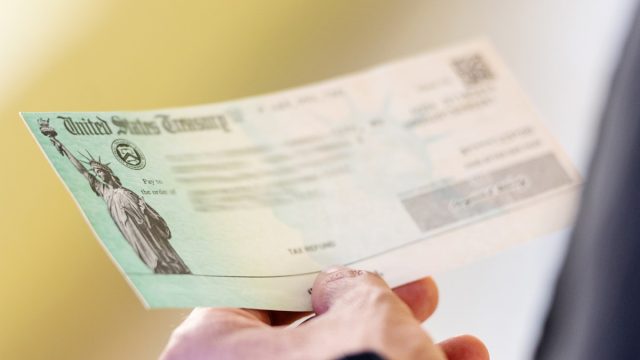New Warning About Fraudulent Tax Refunds: “These Checks Are Fake”

Tax season is well underway, and if you’ve already filed, you’re probably hoping to get your refund very soon. But don’t let your eagerness get you into trouble. If your money arrives too suddenly or comes with other red flags, take caution before cashing that check. A Pennsylvania woman is now sounding the alarm about fraudulent tax refunds after receiving two surprise checks, which the Internal Revenue Service (IRS) has since confirmed were not sent by them.
RELATED: IRS Issues New Alert on 5 Things You Must Declare on Your Taxes This Year.
Amy Deal from Butler, Pennsylvania, was immediately suspicious when two official-looking envelopes, purportedly from the U.S. Department of the Treasury, arrived in her mail on Feb. 12, local NBC-affiliate Channel 11 reported.
“The first thing I thought of was these are fake,” Deal told the news station. “These checks are fake. I file for direct deposit and have for the past 20 years!”
When Deal checked her IRS app, it indicated that her refund—which would be coming through direct deposit—was still pending. She said the checks were dated from 2019 and 2020, but had just been issued the week prior. Neither indicated that they were a previous “Economic Impact Payment” or COVID stimulus check from that time either. And there were other suspicious details.
“They were just in my name, which our tax return is never just in my name seeing as we file jointly and we have a small business,” Deal explained.
Deal called the IRS, and was on the phone for nearly an hour as the agency tried to figure out why she had been sent the checks.
“[The agent] said ‘I really dug, I want them to be real, but there is nothing on your account, especially in those amounts, that even resemble anything being distributed to you,’” Deal told Channel 11.
RELATED: IRS Warns 20% of Taxpayers Don’t Claim Major Refund Credit—Are You Eligible?
While the IRS didn’t directly say that the checks were fake, they told Channel 11 that it is very unlikely that Deal would have received a mailed refund this early based on when she filed. They also noted that the refund amount on the checks did not match the amount she was told she would receive when she filed online.
With that in mind, there is a very good chance that Deal could be on the opposite end of a “growing scam” that the IRS first warned taxpayers about back in 2018. According to a news release from the agency, this scheme involves scammers breaching tax practitioners’ computer files, stealing client data, and filing fraudulent tax returns.
“In one version of the scam, criminals posing as debt collection agency officials acting on behalf of the IRS contacted the taxpayers to say a refund was deposited in error, and they asked the taxpayers to forward the money to their collection agency,” the IRS explained.
As with most scams, the goal is to get taxpayer money.
“In another version, the taxpayer who received the erroneous refund gets an automated call with a recorded voice saying he is from the IRS and threatens the taxpayer with criminal fraud charges, an arrest warrant and a ‘blacklisting’ of their Social Security Number,” the agency added. “The recorded voice gives the taxpayer a case number and a telephone number to call to return the refund.”
RELATED: Grandma Reveals How She Lost $150,000 to Wells Fargo Scam—And How She Got It Back.
So, what should you do if you receive an erronious refund check in the mail? Void it and mail the check back to the appropriate IRS location based on the city it was issued from. If you’ve already cashed it, you will need to send a personal check or money order back to the IRS.
It’s also important to watch out for red flags when you receive refund checks—which Deal said there were plenty of in her case. For instance, the paper the checks were issued on didn’t match.
“This one feels more like a paper check, a thicker piece of paper and that one you’re holding feels more like printer paper,” Deal explained to Channel 11 reporters.
All checks issued by the U.S. Department of Treasury are “printed on watermarked paper,” according to the agency’s website.
“The watermark reads ‘U.S. TREASURY’ and can be seen from both the front and back of the check when held up to a light,” the Department of Treasury states. “The watermark is light and cannot be reproduced by a copier. Any check not having the watermark should be suspected as being counterfeit or copied.”
Deal did not see that watermark on either check, and Channel 11 said its reporters did not either. But the biggest red flag for the Butler woman was that she received a paper check despite filing for a direct deposit refund.
“Had I been someone who filed paper, I might have been duped myself,” she told the news outlet.